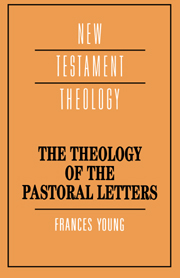Book contents
- Frontmatter
- Contents
- Editor's preface
- List of abbreviations
- 1 Theology and its context
- 2 Theology and ethics
- 3 God and the divine activity
- 4 The importance of sound teaching or What about doctrinal orthodoxy?
- 5 Duties in the household of faith or What about church order?
- 6 The contribution of the Pastorals to the reception of Paul as an Apostle
- 7 The Pastorals as scripture
- Annotated bibliography
- Index of references
- Index of subjects
4 - The importance of sound teaching or What about doctrinal orthodoxy?
Published online by Cambridge University Press: 01 October 2009
- Frontmatter
- Contents
- Editor's preface
- List of abbreviations
- 1 Theology and its context
- 2 Theology and ethics
- 3 God and the divine activity
- 4 The importance of sound teaching or What about doctrinal orthodoxy?
- 5 Duties in the household of faith or What about church order?
- 6 The contribution of the Pastorals to the reception of Paul as an Apostle
- 7 The Pastorals as scripture
- Annotated bibliography
- Index of references
- Index of subjects
Summary
The fundamental interest of the Pastorals would appear to be ‘healthy’ or ‘sound teaching’. Eight times in all, we find concern for the ‘health’ of teaching or words, or anxiety that church members be ‘healthy’ in faith. Since the frequent references to ‘teaching’ are often translated as ‘doctrine’, the impression is created that orthodoxy is a primary issue, and this contributes to the usual overall estimate of scholars that the Pastorals date from a period when early charismatic freedom was being curbed by institutionalisation and by what is often referred to as ‘early Catholicism’. Unlike the authentic Paulines, it is said, real argument with the opposition is absent, and the authoritative tradition is simply affirmed against the false-teachers. This is one reason why it is so difficult to determine exactly what the opposition believed; it also feeds the view that the Pastorals, though implicitly dogmatic, are not very theological, a view we have already contested in the previous chapter.
As we have seen, the Pastorals urge a way of life which is grounded in a particular theological view of the way the world is. That view reinforces a positive acceptance of the created order and of society as established by God. It tends against radicalism, and towards the maintenance of social hierarchy. But that is not to say that the result is a kind of primitive catholic orthodoxy. Certainly the stance and language of the Pastorals, read in a particular way when these letters reached canonical status, reinforced the doctrinal authority structures of the church.
- Type
- Chapter
- Information
- The Theology of the Pastoral Letters , pp. 74 - 96Publisher: Cambridge University PressPrint publication year: 1994

